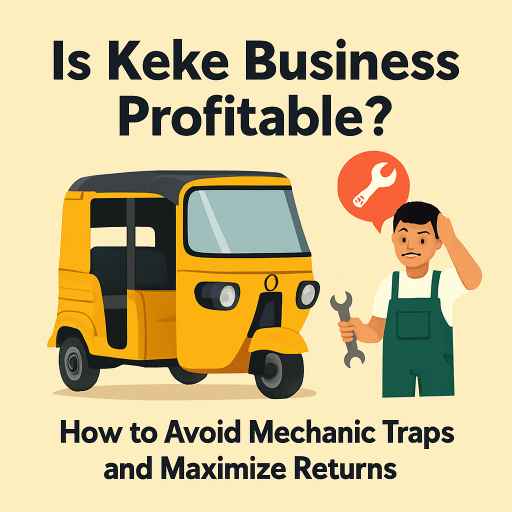
Is keke business profitable? This is a common question asked by many Nigerians looking for reliable income opportunities. The quick answer is yes — but only if it is managed strategically. One of the biggest hidden costs that affect profitability in the commercial transportation sector, especially for keke (tricycle) operators, is the high expense and downtime caused by frequent visits to mechanics.
The Mechanic Trap: A Major Threat to Profitability
In Nigeria, many mechanics operate with limited tools and diagnostic training. When a vehicle develops a fault, proper diagnosis is often missing. Rather than identifying the exact issue, repairs are frequently based on guesswork and trial-and-error. Unfortunately, this means vehicle owners spend a lot of money testing multiple parts and solutions before the real problem is fixed.
This kind of mechanical uncertainty leads to serious time loss, unnecessary expenses, and operational frustration. For anyone asking “is keke business profitable?” it’s important to understand that avoiding excessive repairs is a critical factor in achieving success.
Smart Strategy: Buy New, Use Lightly, and Rotate
One effective method to prevent mechanic-related losses is to purchase new or certified tricycles and use them for a short period — ideally one year to 18 months. After this time, the vehicle should be sold while it’s still in good condition, and a new one acquired.
This proactive cycle keeps the vehicle in its prime and avoids costly breakdowns that come with age and wear. Many successful operators follow this pattern to ensure they spend more time on the road than in repair shops. It’s one of the key answers to “is keke business profitable?” — yes, if smart lifecycle management is practiced.
The Cost of Mechanical Guesswork
Prolonged use of older keke leads to:
- Frequent breakdowns
- High replacement costs for parts
- Reduced daily income due to downtime
- Higher fuel usage caused by engine inefficiency
- Customer dissatisfaction from inconsistent service
Instead of investing in endless repairs, a rotating upgrade strategy makes the most economic sense. Anyone asking, “is keke business profitable?” must calculate these hidden costs to get the full picture.
Preventive Maintenance and Record-Keeping
Another powerful way to protect profits is by keeping a maintenance record. Whether digitally or in a notebook, tracking what parts have been changed and how often faults occur can help spot early warning signs. This also makes it easier to detect mechanic dishonesty or avoid repeating expensive fixes.
With preventive maintenance and proper monitoring, tricycle owners can stay ahead of serious issues. Again, the answer to “is keke business profitable?” leans toward yes — when good maintenance practices are in place.
Choosing Technically Equipped Mechanics
Although many roadside mechanics work hard, they may lack up-to-date tools or training. Vehicle owners should look out for workshops with diagnostic scanners and structured service processes. These shops are more likely to give accurate solutions without unnecessary experimentation.
Some branded tricycle companies also have authorized service centers. Using these centers helps in maintaining the warranty and protecting vehicle value — important if resale is part of your business model. These smart choices support the broader goal: answering “is keke business profitable?” with sustained results, not short-term guesswork.
Scaling the Business
Reinvesting profits instead of spending them on repairs is a major growth strategy. Owners who use part of their profits to buy more kekes or upgrade to newer models can build a fleet over time. Each vehicle becomes a working asset instead of a liability.
With more working days, fewer repairs, and consistent income, the answer to “is keke business profitable?” becomes clearer. Yes — when approached as a system, not just a hustle.
Final Thoughts
So, is keke business profitable? Absolutely — but it depends on the approach. Profitability is lost when operators spend too much time and money at mechanic shops. By buying new, rotating vehicles every year, tracking maintenance, and choosing skilled mechanics, transport operators can build a stable, growing business. In a market full of mechanical guesswork, smart planning is what separates profit from pain.
👉Also check out our well tailored business tip for small business starting new in a new environment